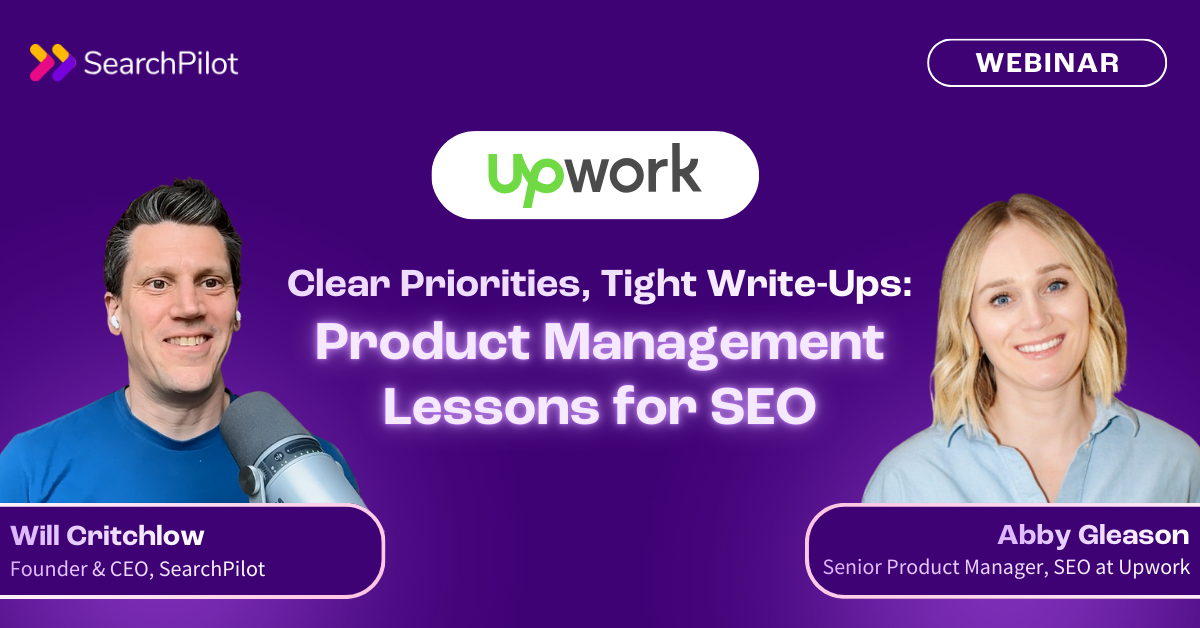In our recent webinar, SearchPilot CEO Will Critchlow sat down with SEO expert Tom Critchlow (yes, his brother) to explore how artificial intelligence (AI) and large language models (LLMs) are reshaping the world of SEO.
Here’s a concise breakdown of key insights from their conversation:
Google's AI Mode: Groundbreaking or Just Grounded?
Tom discussed his recent exploration of Google's new AI Mode and shared why he believes it isn't hitting the mark—yet. The current implementation tends to deliver overly generic answers, often sidelining valuable web content. He proposed a solution: prompting AI to highlight diverse and compelling external links rather than just generating flat, averaged-out answers.
This approach enhances user experience and maintains the relevance and value of the open web, benefiting users, businesses, and Google itself.
The Future of Search Queries
Both Will and Tom predict search queries will massively increase due to AI making search easier and more conversational. This phenomenon, related to an idea known as Jevons ParadoxJevons Paradox, implies that making something more efficient (search in this case) leads to its greater use.
More nuanced, emotional, and complex queries will become standard, dramatically expanding the scope and volume of search activity.
Paid vs. Organic: A Shifting Landscape
The webinar highlighted a critical shift: the balance of paid versus organic links will likely change, possibly favoring paid results. However, Will stressed that organic content is essential for search engines to remain fresh and relevant, especially with timely information and novel content.
A viable SEO strategy should account for a potential future where fewer organic opportunities exist, emphasizing highly engaging, differentiated content.
Why AI Means New Tactics for SEO
AI has changed how search engines interpret user intent, moving beyond exact-match keywords to understanding nuanced questions. Tom emphasized that traditional keyword-focused strategies are rapidly losing effectiveness.
SEO professionals should pivot to strategies focused on intent, relevance, and meeting users precisely where they are in their search journey.
Embracing SEO Experimentation
With increased volatility in organic search results due to algorithm changes and AI-driven search engines, testing is more crucial than ever. Will and Tom advocated for regular SEO experimentation, stressing the importance of understanding precisely which tactics drive measurable results.
Using SEO A/B testing, marketers can confidently adapt to algorithmic updates and remain competitive.
How to Justify SEO Investments
Tom emphasized the importance of clear input metrics—measurable actions tied directly to SEO efforts. Rather than relying solely on traffic metrics, marketers should use concrete, actionable indicators (like content quality, feature coverage, or testing frequency) to clearly communicate their strategy's value to executives.
This practice makes it easier to secure ongoing budget and executive buy-in.
Practical Advice for SEO Leaders
The discussion concluded with practical advice for SEO leaders:
- Prioritize clear communication to avoid misunderstandings and streamline internal approvals.
- Anchor your strategy in measurable input metrics to clearly demonstrate progress.
- Use SEO testing data to directly tie SEO activities to revenue and business impact.
Stay Competitive with SearchPilot
Want to stay ahead in the age of AI-driven search? Schedule a personalized demo with SearchPilot and discover how our SEO testing platform can help your brand navigate these changes, optimize effectively, and drive consistent growth.
![[Webinar Replay] Beyond Google – How AI and LLMs Are Changing SEO Forever](https://www.searchpilot.com/hs-fs/hubfs/Beyond%20Google%20-%20How%20AI%20and%20LLMs%20are%20changing%20SEO%20Forever.png?width=800&height=450&name=Beyond%20Google%20-%20How%20AI%20and%20LLMs%20are%20changing%20SEO%20Forever.png)

%20(9).png)
%20(7).png)